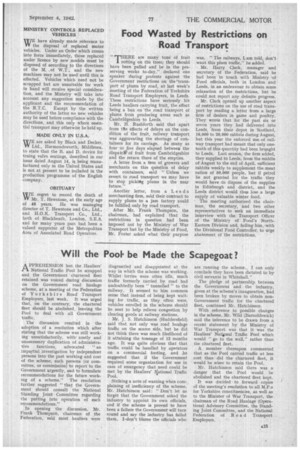Food Wasted by Restrictions on Road Transport
Page 17

If you've noticed an error in this article please click here to report it so we can fix it.
THERE are many tons of fruit
1 rotting on th.e trees; they should have been pulled and be in the preserving works to-day," declared one speaker during protests against the Government restrictions on the 'transport of plums by road, at last week's meeting of the Federation of Yorkshire Road Transport Employers, in Leeds. These restrictions have seriously hit Leeds hauliers carrying fruit, the effect being a ban on the road transport of plums from producing areas such as Cambridgeshire to Leeds.
Mr. H. Rushforth said that apart from the effects of delays on the condition of the fruit, railway transport was aggravating the shortage of containers for its carriage. As many as four or five days elapsed between the dispatc# of fruit from Cambridgeshire and the return there of the empties.
A letter from a firm of growers and merchants on this question of delay with containers, said "Unless we revert to road transport we may have to stop picking plums in the near future."
Another letter, from a Leeds merchanting firm, said their contract to supply plums to a jam factory could be fulfilled only by road transport.
After Mr. Frank Thompson, the chairman, had explained that the restrictions in question had been imposed not by the Ministry of War Transport but by the Ministry of Food, Mr. Foster asked what their purpose
was. "The railways, I. am told, don't want this plum traffic," he added.
Mr. Han-y Clark, manager and secretary of the Federation, said he had been in touch with Ministry .of Food officials, both in London and Leeds, in an endeavour to obtain some relaxation of the restrictions, but he could not report any definite progress.
Mr. Clark opened up another aspect of restrictions on the use of road transport by reading a letter from a large firm of dealers in game and poultry. They wrote that for the past six or seven years they had delivered into Leeds, from their depot in Scotland, 16,000 to 20,000 rabbits during August, but this year the enforced use of railway transport had meant that only onetenth of this quantity had been brqught to Leeds. Last season, the firm added, they supplied to Leeds, from the middle of•August to the end of April, sufficient rabbits weekly to supplement the meat ration of 50,000 people, but if petrol be not granted for the traffic they would have to dispose of the supplies in Edinburgh and district, and the Leeds district would thus lose a large supply of valuable winter food.
• The meeting authorized the chairman, the secretary, and two other representatives to seek an immediate interview with the Transport Officer of the Ministry of Food's NorthEastern Division and, failing him, with the Divisional Food Controller, to urge abatement of the restrictions.




















































